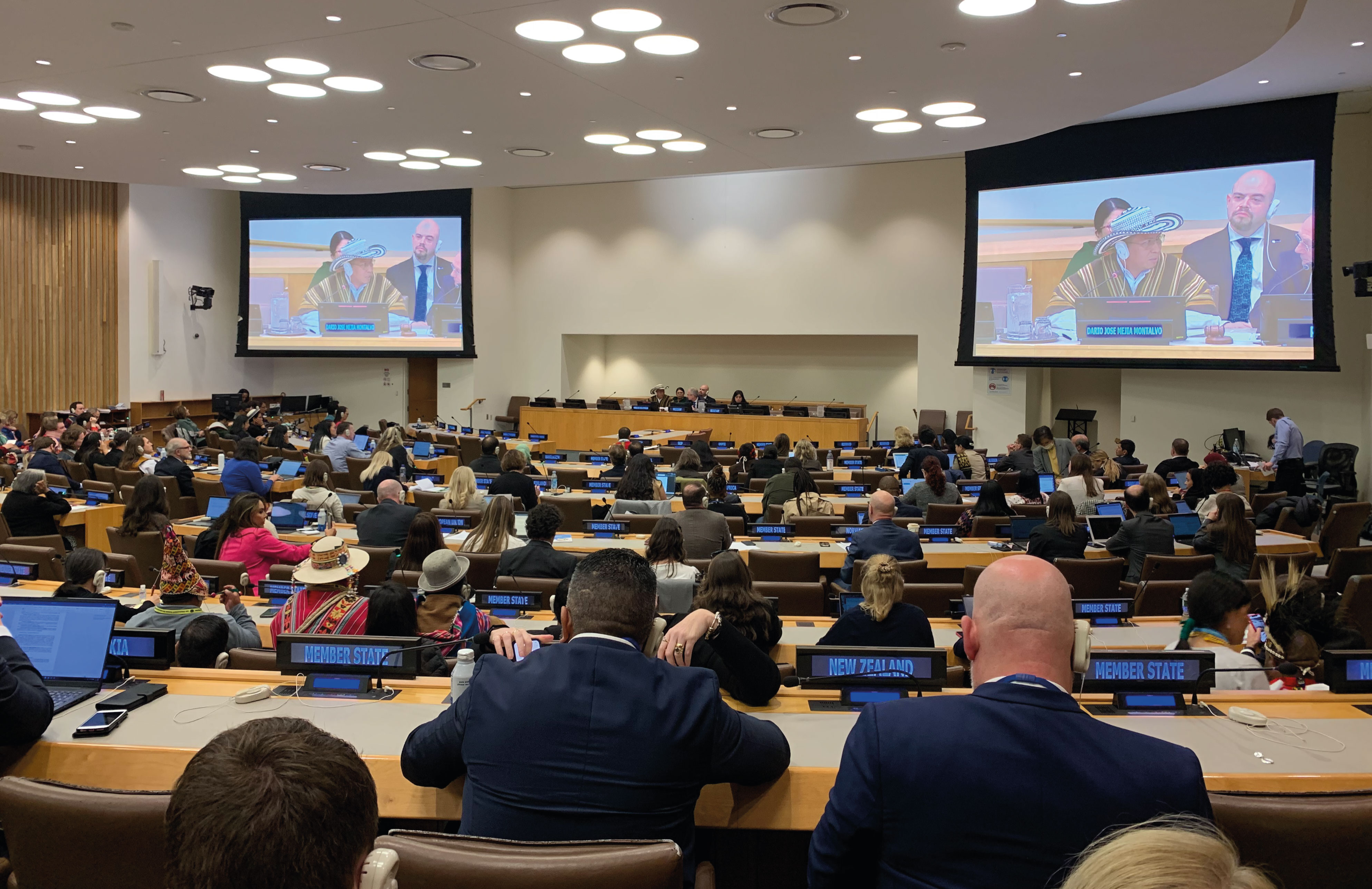Lola García-Alix is a senior advisor on Global Governance at the International Work Group for Indigenous Affairs (IWGIA), and since the first session of the United Nations Permanent Forum on Indigenous Issues in 2002, she has been following all its annual sessions. The specialist explains that the Forum sessions plays an important role as an amplifier, drawing the attention of the international community to the situation of Indigenous Peoples around the world. It is also an instrument for Indigenous Peoples to engage in dialogue with States and present their demands to ensure respect and protection of their rights. Regarding this year's main theme of the session, Lola points out that all the interventions by Indigenous Peoples emphasized that there is no separation between human health and planetary health. Without the well-being of their territories, one cannot speak of the health of Indigenous Peoples. She also celebrates the increased participation of indigenous women and youth in meetings like the Permanent Forum.
Lola García-Alix is a senior advisor on Global Governance at the International Work Group for Indigenous Affairs (IWGIA), and since the first session of the United Nations Permanent Forum on Indigenous Issues in 2002, she has been following all its annual sessions. The specialist explains that the Forum sessions plays an important role as an amplifier, drawing the attention of the international community to the situation of Indigenous Peoples around the world. It is also an instrument for Indigenous Peoples to engage in dialogue with States and present their demands to ensure respect and protection of their rights. Regarding this year's main theme of the session, Lola points out that all the interventions by Indigenous Peoples emphasized that there is no separation between human health and planetary health. Without the well-being of their territories, one cannot speak of the health of Indigenous Peoples. She also celebrates the increased participation of indigenous women and youth in meetings like the Permanent Forum.
Indigenous Debates: Based on your work at IWGIA, you witnessed the founding of the Permanent Forum on Indigenous Issues in 2002. What memories do you have of the discussions that led to its establishment?
Lola García-Alix: The establishment of the Permanent Forum was a milestone in the Indigenous Peoples' struggle for recognition within the international system and, particularly, within the UN. Indigenous Peoples demanded the creation of a mechanism at the highest possible level within the UN system, where their right to participate would be fully recognized, not just as mere observers. It was a revolutionary moment within the UN because there were no mechanisms with a gender-balanced composition, as Indigenous Peoples demanded. Eventually, a model with 16 members was adopted: eight experts nominated by indigenous organizations and eight experts appointed by states. The nomination of indigenous experts recognizes the self-determination processes of Indigenous Peoples.
DI: Did that initial objective get fulfilled?
LGA: Over the years, the Permanent Forum on Indigenous Issues has truly established itself as a platform by and for the defense and protection of Indigenous Peoples' rights. It is no longer just an official session but has also become a global gathering and dialogue platform for Indigenous Peoples with United Nations agencies, state representatives, NGOs, academics, and those working on the issue. Additionally, it is the largest meeting on all matters related to Indigenous Peoples within the UN: this year alone, over 2,000 people were registered. The Permanent Forum has managed to solidify itself and gain legitimacy within the Indigenous Peoples movement. I believe that the lack of knowledge and information about the situation of Indigenous Peoples would be catastrophic without mechanisms like the Permanent Forum.
DI: What happens with the implementation of the recommendations?
LGA: That's the big challenge. The implementation gap is one of the main problems across all United Nations bodies. There is a difference between multilateral dialogue, political dialogue among states, agreements, commitments, and good intentions, and the reality on the ground for Indigenous Peoples. In most cases, implementation depends on the political will of states. As an advisory body, the Permanent Forum can only make recommendations through the United Nations Economic and Social Council. While it is a significant challenge to make real progress in the implementation of recommendations, it is important to highlight that they are useful as an instrument for Indigenous Peoples in their struggles for the respect and protection of their rights on the ground and in their political dialogue with states.
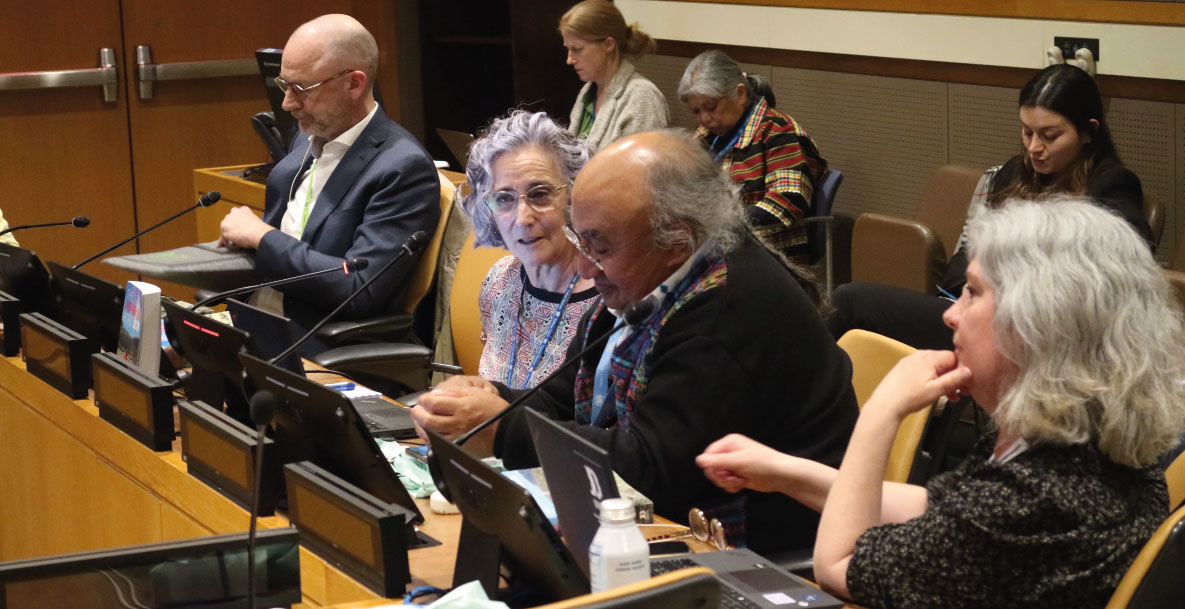
Martin Hermann, Ambassador of Denmark to the UN, Lola García-Alix; the UN Special Rapporteur on the Rights of Indigenous Peoples, Francisco Cali Tzay, and Kathrin Wessendorf, Director of IWGIA, during the presentation of Indigenous World 2023.

Martin Hermann, Ambassador of Denmark to the UN, Lola García-Alix; the UN Special Rapporteur on the Rights of Indigenous Peoples, Francisco Cali Tzay, and Kathrin Wessendorf, Director of IWGIA, during the presentation of Indigenous World 2023.
DI: Isn't there an overlap between the Permanent Forum and the work of the Special Rapporteur on the rights of Indigenous Peoples and the Expert Mechanism on the Rights of Indigenous Peoples?
LGA: The mandates of these three mechanisms are undoubtedly very important, and there is good cooperation and complementarity in the work they carry out. I believe they have very specific mandates. The Permanent Forum has a broader mandate focused on ensuring that United Nations System including its agencies and funds, develop and implement programs and policies in accordance with the rights established in the UN Declaration on the Rights of Indigenous Peoples of 2007. On the other hand, the Special Rapporteur is more oriented towards documenting and monitoring the human rights situation of Indigenous Peoples. They can conduct country visits, engage in specific cases, send communications to states, and request responses regarding certain issues. Finally, the Expert Mechanism is an advisory body to the Human Rights Council and conducts thematic studies. It also provides technical advice on the implementation of specific rights if requested by states.
DI: How do these mechanisms collaborate during the sessions of the Permanent Forum?
LGA: During the sessions of the Permanent Forum, the Special Rapporteur and, at a minimum, the Chair of the Expert Mechanism participate. They present their work during the session and also make recommendations to the Forum, States and Indigenous Peoples. In return, the Special Rapporteur and the Chair of the Permanent Forum also participate in the annual meeting of the Expert Mechanism held in Geneva. In conclusion, efforts are made to ensure institutional synergy among the work of the three mechanisms, although it is sometimes challenging within the compartmentalized system of the United Nations.
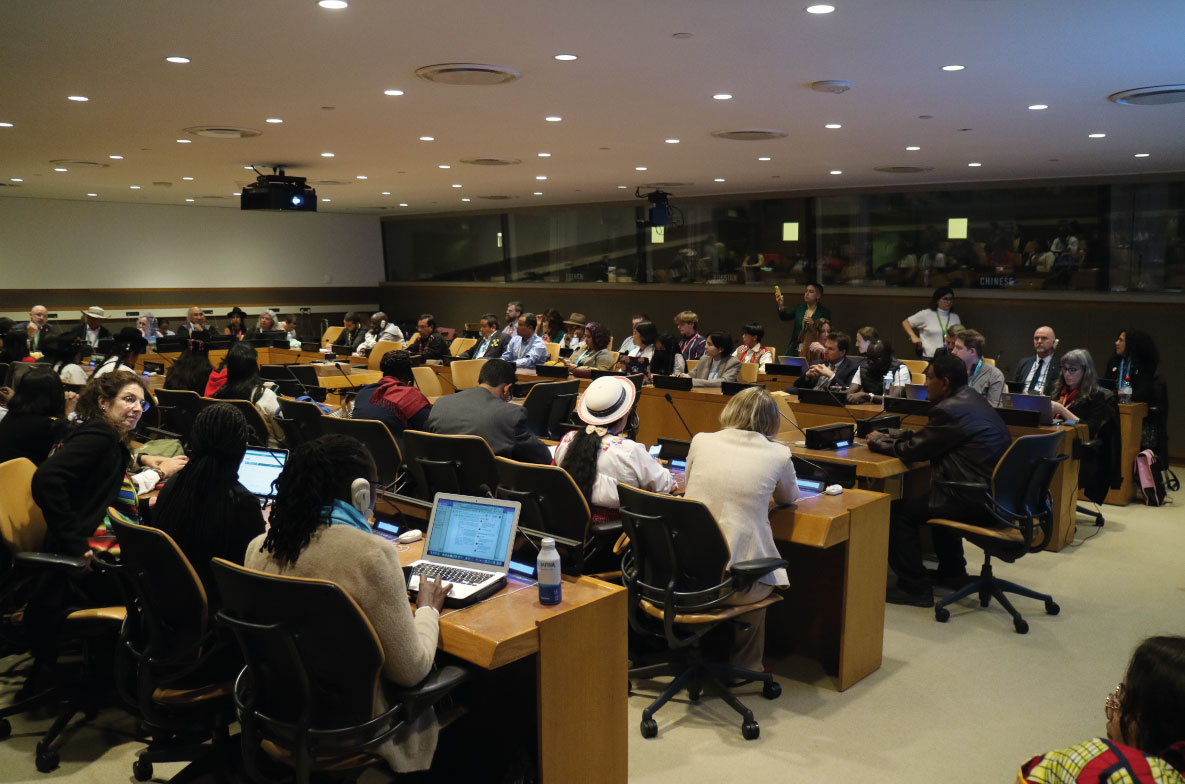
In this edition of the Permanent Forum, more than 2000 people were registered. Photo: IWGIA
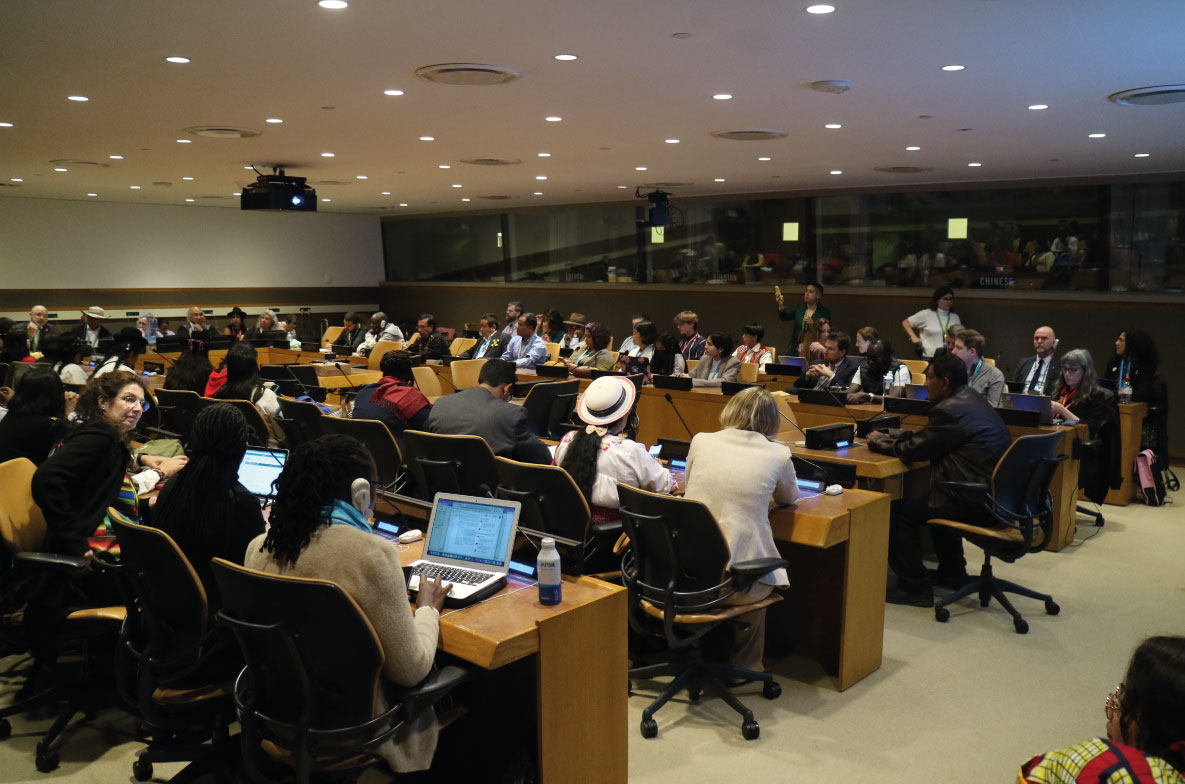
In this edition of the Permanent Forum, more than 2000 people were registered. Photo: IWGIA
DI: What topics were discussed during the 22nd Session of the Permanent Forum held from April 17 to 28 in New York?
LGA: First and foremost, I think it’s important to note that the 2023 session was the first fully in- person session in three years due to the pandemic. In 2022, it was a hybrid session as there were still many restrictions related to vaccination, and on-site participation was very limited. This year, the session opened at a very high level with speeches from the Secretary-General of the United Nations, António Guterres; the President of Colombia, Gustavo Petro; the Secretary of the Interior of the United States, Debra Haaland (a Native American), and other high-ranking UN officials.
DI: Why was the theme "Indigenous Peoples, Human Health, Planetary Health, and Territory and Climate Change: A Rights-Based Approach" chosen?
LGA: The selection of session themes is decided by the Permanent Forum based on proposals submitted by indigenous representatives during the session’s agenda item on its future work. The message from Indigenous Peoples is that they cannot separate human health from planetary health or the health of their territories. Indigenous Peoples reflected very well the importance and the need for the health issue to be viewed in a holistic and intercultural way. In other words, one cannot talk about indigenous health or the health of Indigenous Peoples without addressing their issues, the lack of recognition of their territories, and the need for the recognition of their right to self-determination. The report of this session clearly reflects the message of Indigenous Peoples and serves as a monitoring tool.
DI: Was there an assessment of the pandemic?
LGA: Although the impact of the pandemic on Indigenous Peoples was one of the central topics last year, it had less prominence this year. However, the impact of COVID-19 has become an indicator of how a crisis of this magnitude affects Indigenous Peoples and exacerbates the problems they face daily due to lack of recognition, discrimination, marginalization, and their lack of participation in decision-making processes on issues that directly affect them. At the same time, the importance of indigenous governance has been recognized. The higher the level of recognition of indigenous governance systems, the greater the resilience of Indigenous Peoples to the impact of the pandemic.
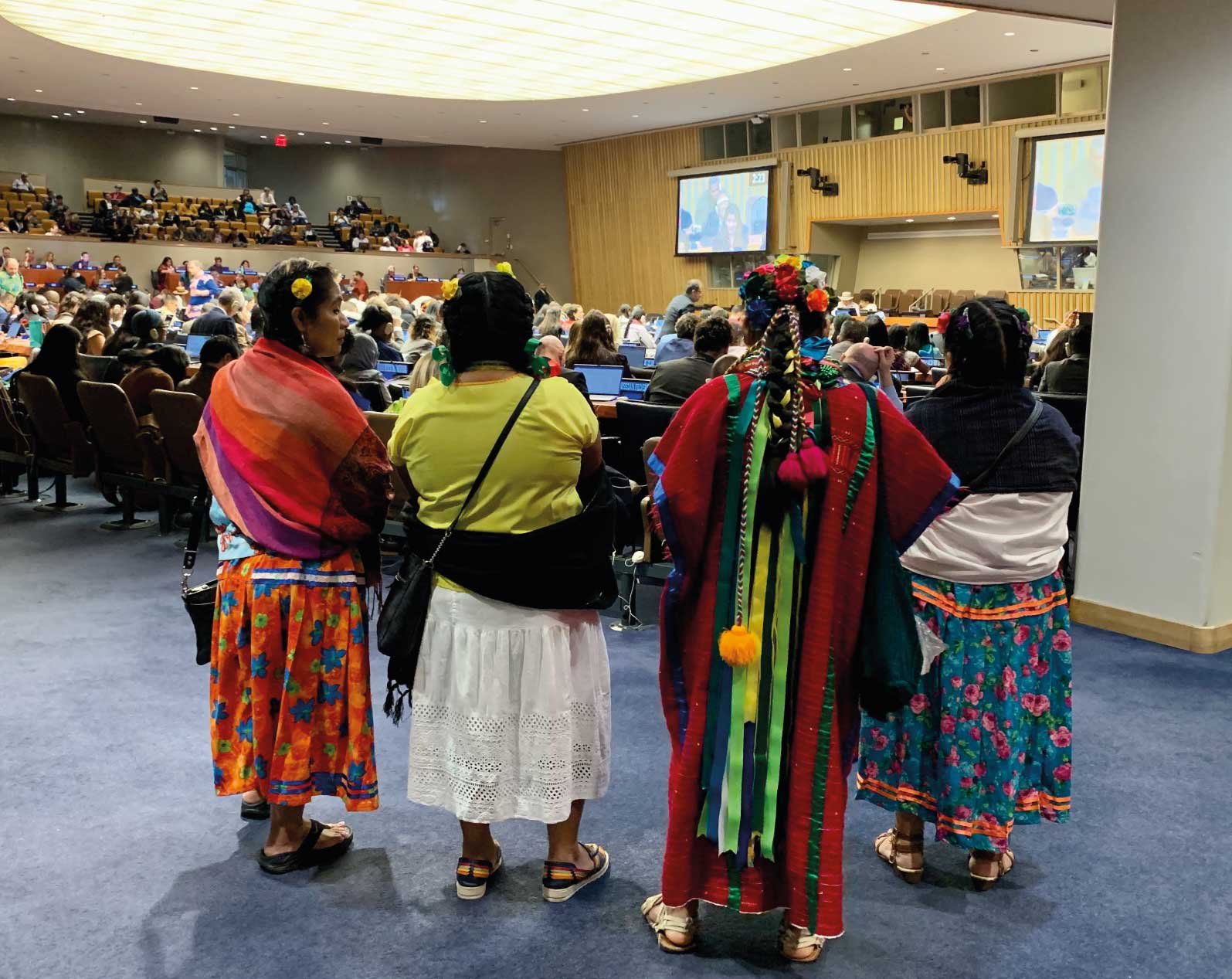
The participation of Indigenous Women has increased through their organizations and networks in international processes. Photo: Lola García-Alix
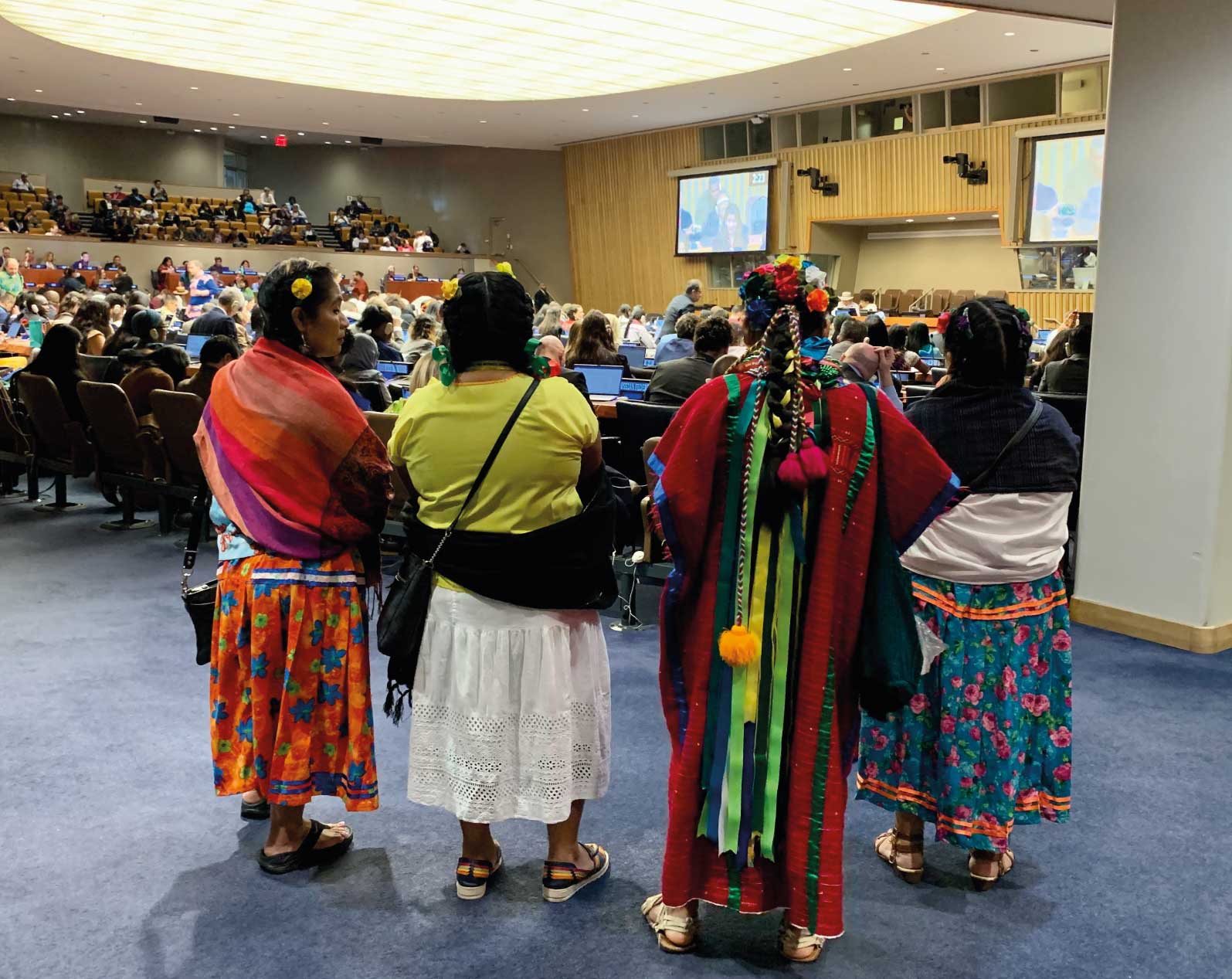
The participation of Indigenous Women has increased through their organizations and networks in international processes. Photo: Lola García-Alix
DI: What is the conclusion regarding the human rights situation of Indigenous Peoples?
LGA: The worsening of the human rights situation of Indigenous Peoples in many countries, especially in non-democratic governments, is of great concern. Conflicts over land, territories, and resources have intensified, and there has been an increase in the criminalization and killings of indigenous rights defenders. We are also witnessing a rise in intimidation attempts and even reprisals by some states against indigenous representatives participating in international meetings, including the sessions of the Forum, despite the UN Secretary-General establishing a specific mechanism to protect individuals or groups cooperating or engaging with the UN and its human rights mechanisms. This trend is undoubtedly discouraging. On one hand, we hear progressive, positive speeches recognizing the rights of Indigenous Peoples from many states, but on the other hand, the violation of their rights continues to increase in many countries. During this year’s Permanent Forum session, the interventions made by indigenous representatives clearly reflected that in most countries around the world, their rights continue to be abused, ignored, or systematically violated.
DI: Was it also an important session for indigenous women?
LGA: This year was particularly significant because the United Nations Committee on the Elimination of Discrimination against Women (CEDAW) adopted an excellent general recommendation a few months ago: General Recommendation No. 39 on the rights of indigenous women and girls. States that have ratified this UN convention, which is the majority, have an obligation to implement it and include information about the implementation of Indigenous Women’s rights in their reports to the CEDAW Committee. Therefore, the Permanent Forum decided to pay special attention to monitoring its implementation by states. Various events were organized during the Forum session to highlight the importance of this recommendation and the need to promote its implementation. It is also important to note that the participation of indigenous women through their organizations and networks in international processes has increased, as well as that of young people who are very active in the Forum sessions. Through the Global Indigenous Youth Caucus, they present statements during the discussion of various agenda items and organize events specifically to discuss the concerns and issues of indigenous youth.
DI: As a parallel event to the Permanent Forum, the presentation of The Indigenous World 2023 took place, with conservation as its central theme. What was the assessment in this regard?
LGA: The issue of conservation is of utmost importance to Indigenous Peoples because, in the name of conservation, they have been dispossessed of their lands and livelihoods, systematically violating all their rights as recognized in the Declaration on the Rights of Indigenous Peoples, particularly their rights to land, territory, and natural resources. Indigenous Peoples have demonstrated their role as custodians and conservationists of nature; it is documented that their territories possess the highest biodiversity in the world. Therefore, it is crucial to ensure that any conservation policy, program, or decision recognizes, respects, and ensures the full respect of the rights of Indigenous Peoples to their lands, territories, and natural resources.
